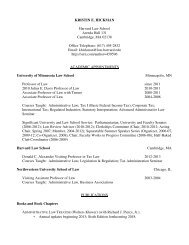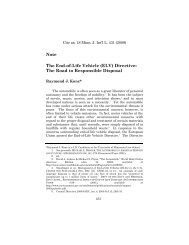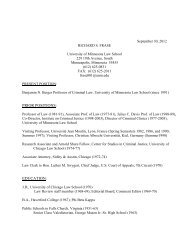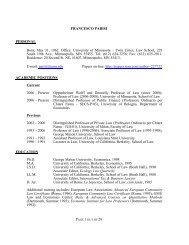Enabling Private Ordering - the University of Minnesota Law School
Enabling Private Ordering - the University of Minnesota Law School
Enabling Private Ordering - the University of Minnesota Law School
Create successful ePaper yourself
Turn your PDF publications into a flip-book with our unique Google optimized e-Paper software.
74 MINNESOTA JOURNAL OF INT’L LAW [Vol. 18:1<br />
<strong>the</strong> doctrine <strong>of</strong> change <strong>of</strong> circumstances has been read into<br />
contracts between States and foreign nationals. 206 This<br />
widespread acceptance <strong>of</strong> <strong>the</strong> doctrine in domestic and<br />
international law <strong>the</strong>refore suggests that it constitutes a<br />
general principle <strong>of</strong> law. 207<br />
What is common to all <strong>the</strong>se doctrines is that <strong>the</strong>y<br />
constitute ways <strong>of</strong> dealing with contingencies that arise in longterm<br />
relational contracts. The elements common to all<br />
expressions <strong>of</strong> <strong>the</strong> clausula in its various shades that justify an<br />
adaptation <strong>of</strong> <strong>the</strong> contractual relationship are:<br />
1. <strong>the</strong> change <strong>of</strong> circumstances that were ei<strong>the</strong>r<br />
explicitly stipulated or presupposed by <strong>the</strong> parties<br />
after <strong>the</strong> conclusion <strong>of</strong> <strong>the</strong> contract;<br />
2. <strong>the</strong> risk <strong>of</strong> <strong>the</strong> change <strong>of</strong> circumstances is outside <strong>the</strong><br />
sphere <strong>of</strong> risk <strong>of</strong> both parties according to <strong>the</strong> risk<br />
allocation <strong>of</strong> <strong>the</strong> contract;<br />
3. <strong>the</strong> change <strong>of</strong> circumstances was not foreseeable;<br />
and<br />
4. <strong>the</strong> change affected <strong>the</strong> contractual equilibrium<br />
significantly so that one has to assume that <strong>the</strong><br />
parties would not have concluded <strong>the</strong> contract <strong>the</strong><br />
way it has been concluded.<br />
In sum, it is widely accepted both in domestic as well as in<br />
international law that <strong>the</strong> principle <strong>of</strong> pacta sunt servanda is<br />
not strictly adhered to but limited with respect to influence <strong>of</strong><br />
future contingencies on <strong>the</strong> contractual bond. This widespread<br />
acceptance should thus also be mirrored in <strong>the</strong> interpretation<br />
signature May 23, 1969, 1155 U.N.T.S. 331, accepts <strong>the</strong> doctrine <strong>of</strong> change <strong>of</strong><br />
circumstances for international treaties; see IAN BROWNLIE PRINCIPLES OF PUBLIC<br />
INTERNATIONAL LAW (4th ed. 1990) 619–21; Detlev F. Vagts, Rebus Revisited:<br />
Changed Circumstances in Treaty <strong>Law</strong>, 43 COLUM. J. TRANSNAT’L L. 459 (2005).<br />
205. See ULRICH AMMANN, DER SCHUTZ AUSLÄNDISCHER PRIVATINVESTITIONEN<br />
IN ENTWICKLUNGSLÄNDERN AUS VÖLKERRECHTLICHER, VOLKSWIRTSCHAFTLICHER<br />
UND BETRIEBSWIRTSCHAFTLICHER SICHT 110–13. (1967); HELMUT FRICK,<br />
BILATERALER INVESTITIONSSCHUTZ IN ENTWICKLUNGSLÄNDERN 52 (1975). See also<br />
LIAMCO v. Libya, 20 I.L.M. 1, 57 (1981) (“[T]he binding force is subject to <strong>the</strong><br />
continuance <strong>of</strong> circumstances under which a treaty was concluded. If such<br />
circumstances change substantially, <strong>the</strong>n its modification or cancellation may be<br />
claimed or resorted to.”).<br />
206. RALF KÖBLER, DIE “CLAUSULA REBUS SIC STANTIBUS” ALS ALLGEMEINER<br />
RECHTSGRUNDSATZ (1991); BIN CHENG, GENERAL PRINCIPLES OF LAW 113, 118–19<br />
(1953) (stressing that a change in circumstances must have been not reasonably<br />
contemplated at <strong>the</strong> time <strong>of</strong> <strong>the</strong> conclusion <strong>of</strong> an international treaty); Norbert Horn,<br />
Changes in Circumstances and <strong>the</strong> Revision <strong>of</strong> Contracts in Some European <strong>Law</strong>s<br />
and in International <strong>Law</strong>, in ADAPTATION AND RENEGOTIATION OF CONTRACTS IN<br />
INTERNATIONAL TRADE AND FINANCE 15, 25 (Norbert Horn ed., 1985).
















